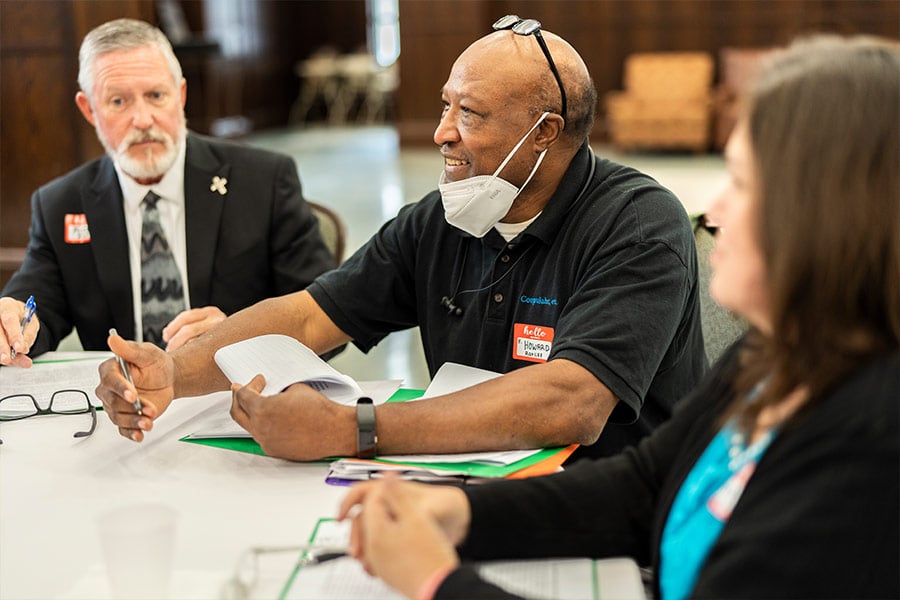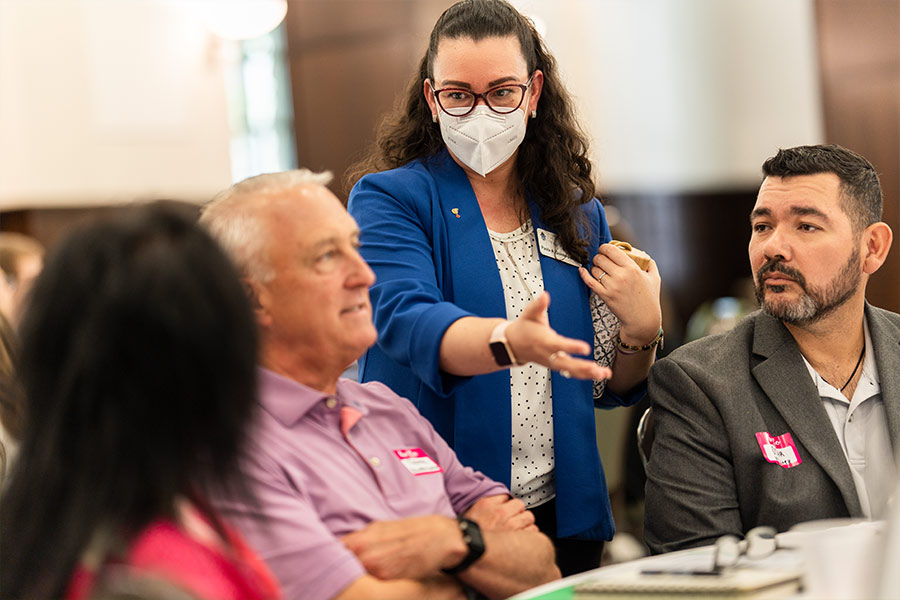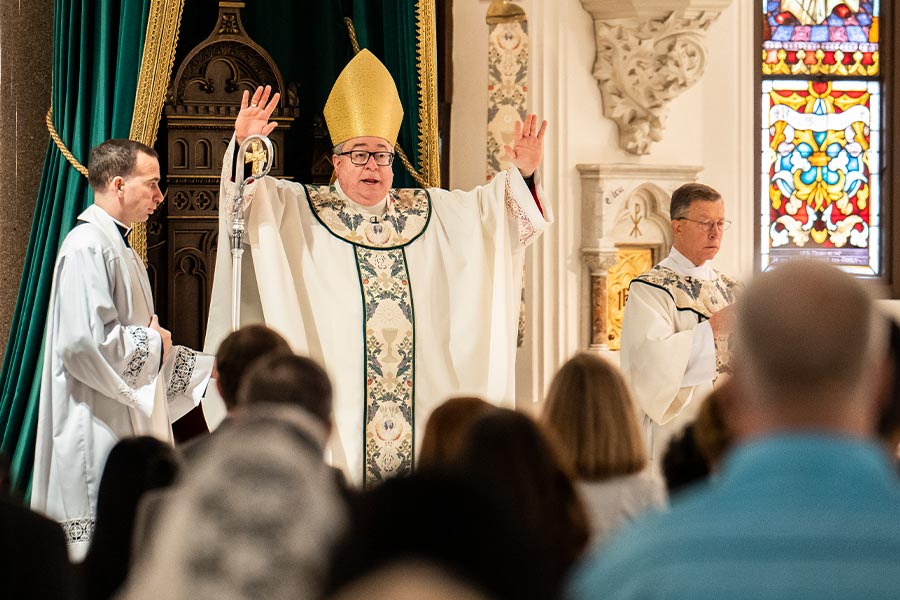Communion, participation, and mission: representatives gather at diocesan pre-synod meeting

Parishioner Howard Ratliff shares with other parish representatives during small group discussions as part of the diocesan phase of the synodal process on May 7, 2022 at St. Patrick Cathedral Parish Hall. (NTC/Juan Guajardo)
FORT WORTH — Ricardo Romero came to the Diocesan Pre-synodal meeting May 7 at St. Patrick Cathedral eager to represent his parish and learn the result of 112 listening sessions held in the diocese this spring as the precursor to the 2023 assembly of bishops in Rome referred to as the Synod on Synodality.
The findings from this first phase of the synodal process allows bishops to hear from a diverse section of Catholics — from parishioners to priests — in a spirit of collaboration and openness. Announced by Pope Francis in October 2021, the Synod invites participation from Catholics worldwide as the Church hopes to learn which processes can help it live communion, achieve participation, and open itself to mission.
“I’m excited to contribute in a small way,” enthused Romero, a Eucharistic minister at St. Francis of Assisi Parish in Grapevine. “I hope what we do here helps the Holy Father understand the current needs we have and what the Church can do in the future.”
Romero was one of 130 delegates from faith communities across the diocese who listened intently to the feedback from parish discussions and then participated in a small group discernment about emerging faith realities and how the Holy Spirit is inviting the Church to move forward.
Seated at a table for Spanish speakers, the church volunteer provided a Latino perspective to the synodal conversation.
“We want to have more ministries and events that support the Hispanic community so they feel part of the Church,” he added.
After celebrating Mass, Bishop Michael Olson welcomed delegates to the Diocesan Pre-Synodal meeting by saying he was grateful the process emphasized listening.
“We have to speak the truth and we have to speak it kindly, patiently, and clearly,” he pointed out. “Loudly is not the way that is going to get us forward and it’s certainly not what the Lord is asking of us.”
As he travels across the diocese administering the sacrament of Confirmation, the bishop witnesses how the local Church is growing and being evangelized.
“I get to see the Church unified under the Holy Spirit imparting gifts, and in that unity, I’m able to see the diversity,” he added. “Because of the diversity among us we can truly listen to people and more clearly share the Gospel.”
Information gleaned from the diocesan gathering is very much essential to the mission of the universal Church as well as the Diocese of Fort Worth, Bishop Olson emphasized.
“With a greater awareness of Christ’s presence, we will be able, as earthen vessels, to discharge the ministry He’s entrusted to all of us as His Church,” he assured the delegates.

Paola Quintero-Araujo, diocesan synod contact, talks with parish representatives during small group discussions as part of the diocesan phase of the synodal process on May 7, 2022 at St. Patrick Cathedral Parish Hall. (NTC/Juan Guajardo)
A synthesized 10-page document, produced from the meeting and reflecting the diversity of views and opinions in the diocese, will be submitted to the U.S. Conference of Catholic Bishops. It ends the diocesan phase of the synodal process which was coordinated by Father Jonathan Wallis, vicar general, and Paola Quintero-Araujo, director of the St. Junipero Serra Institute.
“Our task today is to ensure those major themes the Holy Spirit elicited from us during the listening sessions make their way into the final document,” Fr. Wallis said, explaining the meeting’s objective. “We’re looking for commonalities to make sure the primary issues are heard and the diocese is well represented.”
The 3,311 people who attended listening sessions across the 28-county diocese came from both rural and urban parishes, four campus ministry groups, the deaf community, and retired residents of St. Francis Village. Forty-one responses also were received via survey from parishioners unable to attend a listening session. A wide range of age groups were represented.
“This is our opportunity to get a birds-eye view of the whole diocese and the great gifts and riches the Holy Spirit has given us,” Fr. Wallis added.
One of the overwhelming themes emerging from the diocesan consultative process was the need for people to feel connected to the Church and each other.
“I think there is a real longing for people who drifted away [from the parish] during COVID to come back,” the vicar general observed. “Their presence is missed.”
After reminding the audience the theme for the Synod on Synodality is communion, participation, and mission, Quintero-Araujo explained why each listening session in the diocese began with Mass or Adoration before the Blessed Sacrament.
“At the direction of the bishop, we wanted it to be a spiritual process,” she said. “We have to listen first and foremost to God to see what He is telling us. We can then be open to listening to the same voice in our brothers and sisters.”

Bishop Michael blesses parish representatives during a Mass prior to the diocesan pre-synodal meeting on May 7, 2022 at St. Patrick Cathedral. (NTC/Juan Guajardo)
The majority of people participating in the listening sessions were Caucasian or Hispanic with a large representation coming from the Asian and African-American communities. A few Pacific Islanders and Alaskan or native Americans also attended. Most participants were involved in parish ministries, groups, or leadership.
“The numbers reflected the demographic reality of the diocese,” explained Quintero-Araujo, noting organizers grouped responses from the parish listening sessions into three categories: spiritual, service, and fellowship.
“First and foremost, the way people feel we are journeying together [in our diocese] is through the Eucharist,” she told the audience. “It’s the sacrament of unity around which all the races, cultures, languages, and age groups gather.”
Before starting the small group discussions, Quintero-Araujo asked delegates to focus on the steps and paths the Holy Spirit is asking the Church to take.
Nanya Young made the two-hour drive from DeLeon, Texas to share her rural parish’s experiences with the synodal process.
“I’m curious to see how other people interpreted what we talked about in the listening sessions,” said the Our Lady of Guadalupe parishioner. “At my parish we discussed ways our parish could grow, serve more people, and become better disciples.”
Keeping the younger generation interested in the faith is a concern she hopes is addressed at the Synod.
“Parents are not instilling religion into their children’s lives like they used to,” she stated. “We have to make an effort to keep our youth in the Church.”
After taking part in his parish’s listening session, Pedro Moreno hopes the synodal process inspires a reawakening of faith.
“People are hungry for formation and the opportunity to be together. The Holy Spirit is telling us to satiate that hunger with Jesus Christ,” said the Our Lady of Guadalupe in Fort Worth parishioner. “When you study the faith, you find Jesus. When you go out on mission, you share Jesus. The Church is the presence of Jesus in the world.”
